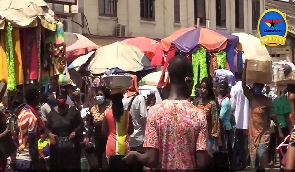Consumers and traders have complained about the prices of items for this year’s festive season, some of which have seen prices more than triple from 2021, a Ghana News Agency market survey has shown.
Many shoppers told GNA that compared to last year, prices of every Christmas food and non-food item for this year had become expensive, making it difficult for them to buy the things they wanted while the traders also bemoaned low patronage.
In various markets and shops visited by GNA in the Central Business of Accra and other markets for two days, it was noted that the Christmas items on sale were in abundance, with heavy human traffic, as people massed up to shop.
The places visited included Makola, Tudu, Malata, Nima, Agbogbloshie, Dome, Kaneshie, Madina, Adabraka and Konkomba markets, where traders tried to attract people to their wares with enticing words, some in the form of songs.
It was noted that the prices of food items, including rice, cooking oil, vegetables, and frozen chicken as well as Christmas decorations – trees, wreath, ribbons, ‘Santa hat,’ had either doubled or tripled compared to the same period last year.
Similarly, the prices of lace fabrics, clothes, shoes, bags, dresses, hampers, and jewelleries, which are heavily patronised during festive season had equally seen a sharp rise, compared to the same period last year.
For example, the price of a five-kilogramme rice, which ranged between GHS45 and GHS60 last year, sold between GHS80 and GHS125, while a five-litre cooking oil, which was sold for GHS70 – GHS80 last year, was GHS270 and GHS280.
In 2021, a local chicken breed cost as much as GHS50, but one needed about GHS100 for the same this year, while the imported breed, sold between GHS50 and GHS70 within the period, now went for GHS170 and GHS220.
For vegetables, a full basket of fresh tomatoes, which was sold at GHS35 last year, was GHS50 and a small basket of onion, which was GHS25, going for GHS50.
The prices of goods and services have been on the rise since the beginning of the year, a situation, the traders attributed to hikes in fuel prices (which recently saw a 15.3 per cent reduction), inflation (currently, 50.3 per cent) and depreciation of the Cedi.
The Ghana Union of Traders Association (GUTA) had earlier warned of soaring prices of goods and services for the yuletide due to the unfavourable trade environment.
Madam Afia Konadu, who sold vegetables, said the prices of vegetables had increased this time because of the high inflation rate and the depreciation of the cedi.
Sharing the same a sentiment, Mad Naa Akorkor added that the fare for transporting food stuff from the hinterlands to the cities had increased, forcing them to increase their prices to stay in business.
Mr Olu Okafor, a jeweller, said: “The prices of jewelleries have increased from five to 15 per cent due to the Christmas festivities, and we have no option than to add something to it so that we can get money to go for them.”
“I’ve been moving from one place to the other since I came to the market to get some moderate price, but to no avail. I’m not sure the money I brought could get me the things I planned for,” a shopper said.
Few days back, the Cedi started appreciating against the dollar, leading to a decline in fuel and transport prices, which both traders and consumers said, they expected would lead to some reduction in goods and services.
Business News of Tuesday, 27 December 2022
Source: GNA

















